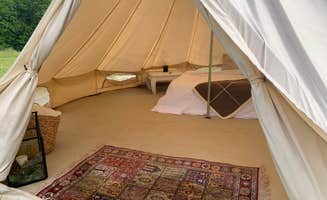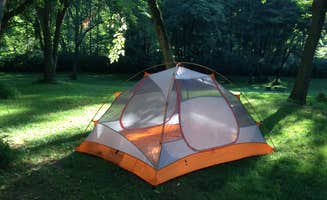Tent campsites near Windsor Heights, West Virginia offer primitive outdoor experiences along rivers and trails. Most sites in this region require self-sufficiency with limited amenities and facilities. Camping areas serve various user groups including hikers, cyclists, and recreational campers, with ground conditions typically consisting of natural terrain with minimal site preparation.
What to do
River access activities: The Dravo's Landing Campground provides tent campers with direct access to the Youghiogheny River for swimming and paddling. "Free bike-in camp site with water access along the Youghiogheny River. Access from the Allegheny Gap trail. There were a few shelters, nice campsite," notes Lauren C.
Trail hiking: Tent camping locations connect to extensive regional trail networks for day hiking. The Laurel Highlands Hemp Cannabis Farm offers unique camping with views of surrounding mountains and hemp fields. Ashley F. mentions, "This is a cannabis friendly campground that overlooks the Laurel Highlands Hemp field, and surrounding mountains."
Night photography: The rural setting provides opportunities for stargazing and night photography at primitive tent sites. Multiple campgrounds report minimal light pollution, creating optimal conditions for astronomical viewing. Train tracks near several campgrounds create scheduling considerations for photography sessions.
What campers like
Budget-friendly options: Several tent camping areas offer free or low-cost accommodations with basic amenities. According to Shari G., Dravo's Landing provides "about 4 lean-to's which can accommodate 4 sleepers, or one 2-person tent. Additional picnic shelters and free-range tables means that the whole troop could pitch their tents and still not be on top of each other."
Trail connectivity: Cyclists appreciate tent sites positioned along major trail corridors. The GAP Trail Campground caters specifically to trail users with strategic location and amenities. Shari G. explains, "The outdoor shower/toilet block is such a divine sight, it makes you crave one whether you're stinky or not. The spacious and lush lawn has lots of space for tents."
Natural surroundings: Tent campers value the rustic, undeveloped settings that maintain natural forest and riverside environments. Lamping Homestead Recreation Area features tent-only camping in a peaceful woodland setting. Reviewer Shari G. describes it as "Simple, Quiet, Beautiful! Just a few miles from the Ohio Covered Bridge Scenic Highway, this lovely tent-only campground offers a pleasant get away."
What you should know
Limited facilities: Most tent sites in the region lack running water, requiring campers to bring their own supply. At Lamping Homestead, "There is no water available, other than the pond, so plan accordingly," advises Shari G. Portable water containers of 2-5 gallons per person per day are recommended.
Wildlife encounters: Proper food storage is essential at tent campsites throughout the area. At Dravo's Landing, Sarah Q. warns, "Just be sure to secure your food overnight - if you don't, the raccoons will make quick work of it!" Food should be stored in sealed containers or hung from trees at night.
Train noise: Several campgrounds experience regular train traffic during overnight hours. Shari G. notes about camping near the GAP trail: "With all this luxury comes an active train too...that's the nature of this trail. Bring those earplugs for a good night's sleep!" Trains typically pass every 60-90 minutes at peak times.
Tips for camping with families
Group-friendly areas: Twin Hills Campground provides electric hookups that can power small devices for children's needs while tent camping. Sites accommodate multiple tents with sufficient space between groups. Campgrounds with group picnic areas offer central gathering spots for shared meals.
Historical features: Several camping areas incorporate historical elements that create educational opportunities. Dravo's Landing includes unique historical features, with Lauren C. noting it's "close to an old cemetery which is useful in telling ghosts stories around the campfire."
Water safety: Families camping near rivers should bring personal flotation devices for children. Current speeds vary by season, with spring flows typically faster and potentially hazardous. Designate supervised swimming areas away from boat traffic.
Tips from RVers
Tent-only sections: RV campers seeking tent experiences appreciate dedicated tent areas separate from vehicle camping. Buffalo Hills Resort maintains distinct camping zones to prevent noise interference between different user groups. Tent sites typically provide more natural surroundings than RV pads.
Parking access: When transitioning from RV to tent camping, consider proximity to vehicle parking. Most primitive tent sites require carrying gear between 20-200 yards from parking areas. Weather conditions can affect path conditions, particularly after rainfall when trails become muddy.
Seasonal considerations: RV campers note significant differences in tent site quality between seasons. Late summer brings drier ground conditions but higher insect activity. Spring offers cooler temperatures but increased precipitation risk, requiring waterproofing preparations and site drainage assessment.



